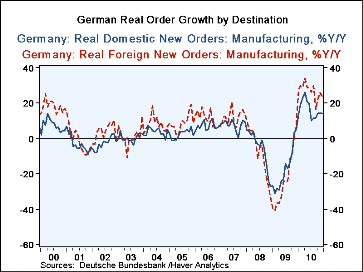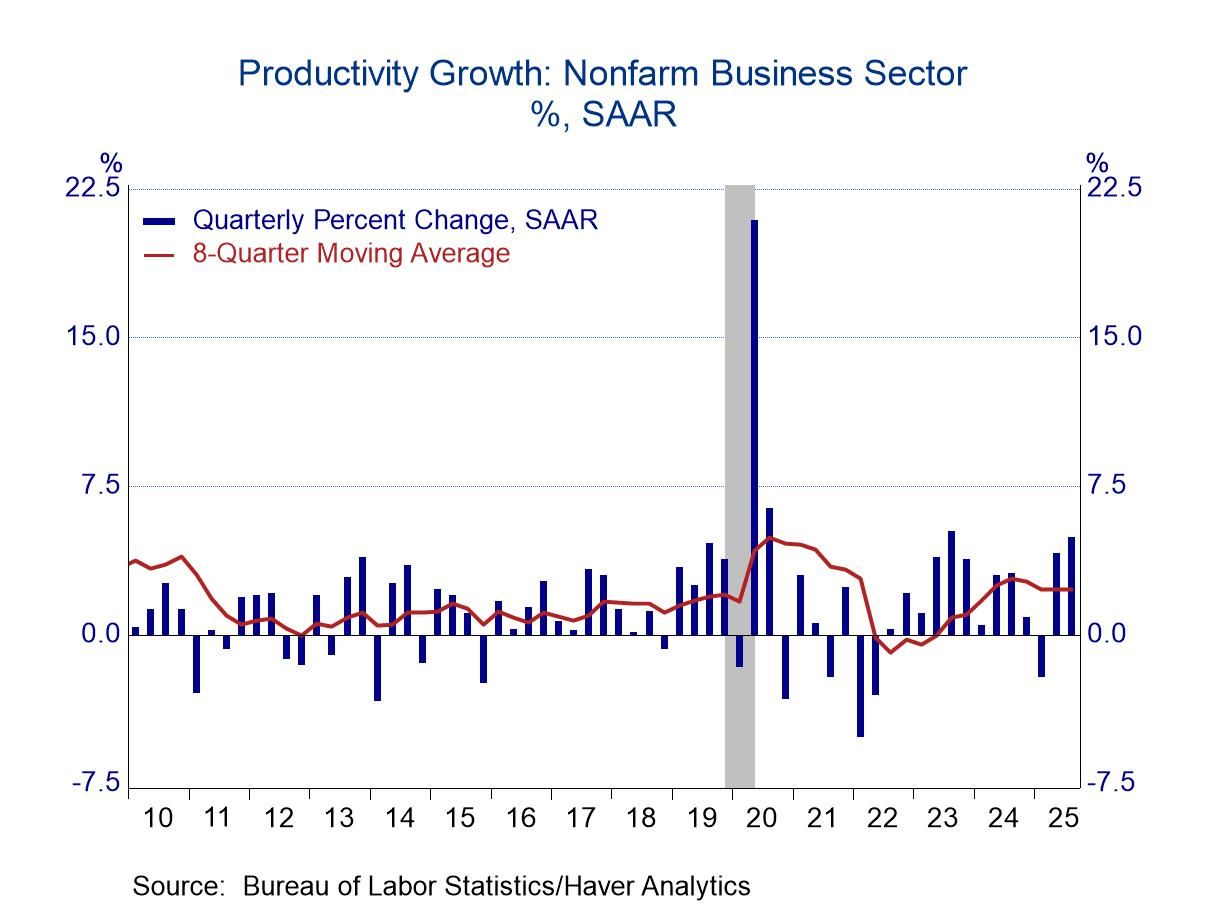 Global| Feb 07 2011
Global| Feb 07 2011German Orders Plunge in December
Summary
Growth in German orders fell sharply in December but there is still a strong yr/yr gain and still a strong push over three months. The December drop merely offsets part of the November surge when orders exploded by 5.2% in the month. [...]
 Growth in German orders fell sharply in December but there is still a strong yr/yr gain and still a strong push over three months.
The December drop merely offsets part of the November surge when orders exploded by 5.2% in the month. That means orders still rose
on balance over the two months by 1.8%. Indeed, over three-months the order growth rate is still a very robust 14.5% when annualized.
After slowing over six months German orders are back on the attack despite this month's set back.
Growth in German orders fell sharply in December but there is still a strong yr/yr gain and still a strong push over three months.
The December drop merely offsets part of the November surge when orders exploded by 5.2% in the month. That means orders still rose
on balance over the two months by 1.8%. Indeed, over three-months the order growth rate is still a very robust 14.5% when annualized.
After slowing over six months German orders are back on the attack despite this month's set back.
Foreign orders continue to show more zest. They are up at a 20% pace over three-months nearly the same as their 24% Yr Yr pace. Domestic orders are up by 7% over three-months and are only about half the 12-month rate of 14%.
Real sector sales data confirm that it is capital goods that are still propelling orders as sales of capital goods are up at a 34% annual rate over three-months much faster than its 19% pace over 12-months. Consumer goods real sales are under 5% for three-months and are dropping over 12-months, so despite their relatively listless behavior they are doing better.
In the fourth quarter orders are up at an a11% rate lead by foreign orders that rose at a pace of 12.7%. real sales of consumer goods rose by 0.4% in the quarter compared to capital goods that expanded at a pace of 37%. Intermediate goods sales rose at a 5% pace.
Europe's economy continues to throw off hot and cold signals but in the end it has continued to grow despite the challenges. Over this weekend the expected deal on a beefed up backstop for indebted European nations hit a snag as Germany is trying to bargain for a host of policy changes to be implemented across Europe before it agrees to backstop anything. While during the week we have heard a lot of agreement over getting these changes implemented, when push came to shove this weekend European nations just could not go along with a host of changes Germany wanted in return for its lending. These ranged from pushing back the retirement age to stopping the indexation of wages to inflation, and much more. Germany is trying to use its financial clout to get changes on the books to make the countries that use this enhanced credit facility more competitive and therefore more trustworthy as borrowers.
Germany's conservative low inflation ways have helped it to amass a huge competitiveness lead over its fellow EMU members. If they do not do something to change that drift, Germany will have such a competitive advantage within the Zone it will be uncatchable. Europe seems to be on the cusp of some sort of realization about what it means to be a currency union and what sorts of autonomy may have to be ceded to the realities of economics because of it. Germany has gained strength and gained competiveness since the euro was formed. It is the inability of Germany's fellow EMU members to depreciate their local currencies (which no longer exist) that has condemned them to a world of second place competition. They have painted themselves into a corner and Germany holds the key to getting them out of their tight spot. Yet other EMU nations see their different policies are part of their national identity instead of as part of their problem and are reluctant to change.
The irony of Europe is this: Germany was afraid to form a currency bloc with countries that were less prone to fight inflation yet this very fact has put Germany in the driver's seat for euro-change. The ECB has done its job well keeping the lid on inflation in the zone over the long haul. Still within the currency union some countries have found ways to run inflation that has been persistently higher than the EMU average. Rather than weakening the Euro, local inflation differences have destroyed competitiveness in these regions and led to ballooning fiscal deficits. These deficits, and the financing troubles they have spawned, have put Germany in the driver's seat as far as dictating reform for the future. Germany has won its battle with Europe but not in a way it expected. It has kept its own inflation low; the ECB has kept Zone-wide inflation in check and the excesses elsewhere have not had knock-on effects adverse to Germany. It's a surprising result. But the rest of Europe still does not 'get it' and is not ready to capitulate to the more conservative financial ways German's demand in return for further loans. Hence the Germans will keep a tight grip on their purse strings for a while longer.
| German Orders and Sales By Sector and Origin | ||||||||
|---|---|---|---|---|---|---|---|---|
| Real and SA | % M/M | % SAAR | ||||||
| Dec'10 | Nov'10 | Oct'10 | 3Mo | 6Mo | 12Mo | YrAgo | QTR-2-Date | |
| Total Orders | -3.4% | 5.2% | 1.9% | 14.6% | 7.1% | 19.5% | 6.9% | 11.2% |
| Foreign | -4.2% | 8.0% | 1.4% | 20.7% | 9.9% | 24.0% | 8.4% | 12.7% |
| Domestic | -2.4% | 1.8% | 2.4% | 7.2% | 3.5% | 14.0% | 5.3% | 9.2% |
| Real Sector Sales | ||||||||
| MFG/Mining | -0.7% | 0.6% | 3.7% | 15.3% | 7.4% | 12.1% | -4.8% | 16.0% |
| Consumer | 0.0% | 1.3% | -0.4% | 3.4% | 1.7% | -1.2% | -4.8% | 0.4% |
| Cons Durables | -1.1% | -0.4% | 2.1% | 2.1% | 1.1% | 6.5% | -6.0% | 3.6% |
| Cons Non-Durable | 0.2% | 1.4% | -0.6% | 3.8% | 1.9% | -2.4% | -4.5% | 0.0% |
| Captial Gds | 0.4% | 0.3% | 7.6% | 37.4% | 17.2% | 19.7% | -7.6% | 37.1% |
| Intermediate Gds | -1.8% | 1.0% | 1.5% | 2.9% | 1.5% | 11.7% | 0.8% | 5.0% |
| All MFG-Sales | -0.7% | 0.7% | 3.7% | 15.7% | 7.6% | 12.3% | -4.6% | 16.3% |
Robert Brusca
AuthorMore in Author Profile »Robert A. Brusca is Chief Economist of Fact and Opinion Economics, a consulting firm he founded in Manhattan. He has been an economist on Wall Street for over 25 years. He has visited central banking and large institutional clients in over 30 countries in his career as an economist. Mr. Brusca was a Divisional Research Chief at the Federal Reserve Bank of NY (Chief of the International Financial markets Division), a Fed Watcher at Irving Trust and Chief Economist at Nikko Securities International. He is widely quoted and appears in various media. Mr. Brusca holds an MA and Ph.D. in economics from Michigan State University and a BA in Economics from the University of Michigan. His research pursues his strong interests in non aligned policy economics as well as international economics. FAO Economics’ research targets investors to assist them in making better investment decisions in stocks, bonds and in a variety of international assets. The company does not manage money and has no conflicts in giving economic advice.






